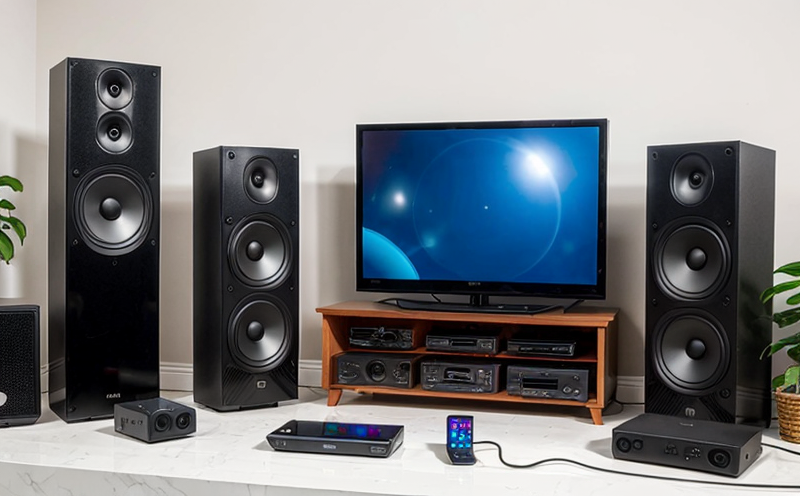ANSI EIA 364 Connector Testing for AV Devices
The ANSI EIA 364 standard is a critical tool in ensuring the reliability and performance of connectors used in audiovisual (AV) devices. This standard provides detailed specifications for connector performance testing, which are essential to meet industry standards and ensure product quality.
During this test, connectors are subjected to various mechanical and electrical stress tests designed to simulate real-world conditions. The purpose is to identify potential weaknesses or vulnerabilities that could lead to failures during use. For example, connectors in AV devices must withstand repeated insertion and removal cycles, vibrations, and exposure to environmental factors like humidity and temperature variations.
The testing process involves a series of steps aimed at assessing the connector's durability, signal integrity, and overall performance. Signal integrity is particularly crucial for AV devices where high-quality audio and video transmission are paramount. This includes evaluating parameters such as resistance, capacitance, inductance, and impedance to ensure they meet specified tolerances.
Connector preparation is a critical step in the testing process. Before testing begins, connectors must be cleaned thoroughly and inspected visually for any defects or anomalies that could affect test results. Once prepared, connectors are then connected to the appropriate equipment used for testing according to ANSI EIA 364 guidelines.
The testing apparatus includes specialized instruments capable of measuring various electrical characteristics of the connectors. These devices can simulate real-world conditions by applying different types of signals and varying environmental factors such as temperature and humidity. The results from these tests are meticulously recorded and analyzed to determine compliance with ANSI EIA 364 standards.
Upon completion of the test, a comprehensive report is generated detailing the connector's performance during each phase of testing. This report serves multiple purposes, including providing valuable insights into any areas requiring improvement or further investigation. It also helps quality managers make informed decisions regarding product design and manufacturing processes to enhance overall product reliability.
Compliance with ANSI EIA 364 standards is not only important for meeting regulatory requirements but also enhances brand reputation by demonstrating commitment to high-quality products. By adhering strictly to these guidelines, manufacturers can ensure their AV devices function correctly under all expected conditions throughout their lifecycle.
Scope and Methodology
The scope of ANSI EIA 364 connector testing for AV devices encompasses a wide range of tests aimed at ensuring the reliability and performance of connectors in audiovisual equipment. The methodology involves both mechanical stress tests, such as insertion force measurement and cycle count evaluation, as well as electrical performance assessments.
- Insertion Force: This test measures the amount of force required to insert a connector into its receptacle. Excessive force can damage the connector or the device it connects to.
- Cycle Count Evaluation: This assesses how many times a connector can be inserted and removed without failure. High cycle counts indicate robust connectors suitable for frequent use in AV devices.
- Electrical Performance Tests: These include resistance, capacitance, inductance, and impedance measurements to ensure the connector maintains optimal signal integrity.
The testing process adheres strictly to ANSI EIA 364 guidelines, which outline precise procedures for each test type. Compliance with these standards ensures accurate results that reflect real-world usage conditions accurately. Rigorous adherence to these protocols guarantees reliable and consistent performance across all tested connectors, enhancing trust in the products' quality.
Industry Applications
| Application Area | Description |
|---|---|
| Home Entertainment Systems | Incorporating high-quality connectors ensures seamless playback of audio and video content. |
| Professional AV Installations | Robust connectors enhance the reliability of installations in demanding environments. |
| Mobile Devices | Connectors for mobile devices must be durable enough to handle frequent use and portability requirements. |
| Automotive Audio Systems | Durable connectors are crucial for automotive audio systems due to their exposure to harsh environmental conditions. |
| Theatrical Lighting Control Systems | Connectors in theatrical lighting control systems need to withstand repeated use and precise signal transmission. |
Incorporating ANSI EIA 364 connector testing into the manufacturing process ensures that connectors used in AV devices meet stringent quality standards. This is particularly important for applications where reliability and performance are paramount, such as home entertainment systems, professional AV installations, mobile devices, automotive audio systems, and theatrical lighting control systems.
Why Choose This Test
- Ensures Compliance: ANSI EIA 364 testing ensures your products meet all relevant regulatory requirements.
- Improves Quality: By identifying potential issues early in the development process, you can improve overall product quality.
- Risk Management: This test helps manage risks associated with substandard connectors by detecting defects before they become costly problems.
- Increase Consumer Trust: Demonstrating commitment to high-quality products enhances brand reputation and consumer confidence.
- Enhances Reliability: Robust connectors are essential for maintaining consistent performance under all expected conditions throughout their lifecycle.
- Promotes Efficiency: Efficient testing processes lead to faster development cycles and reduced costs associated with rework or recalls.
Choosing ANSI EIA 364 connector testing demonstrates your commitment to producing reliable, high-quality AV devices that meet the highest industry standards. This not only enhances product performance but also fosters consumer trust and satisfaction.





